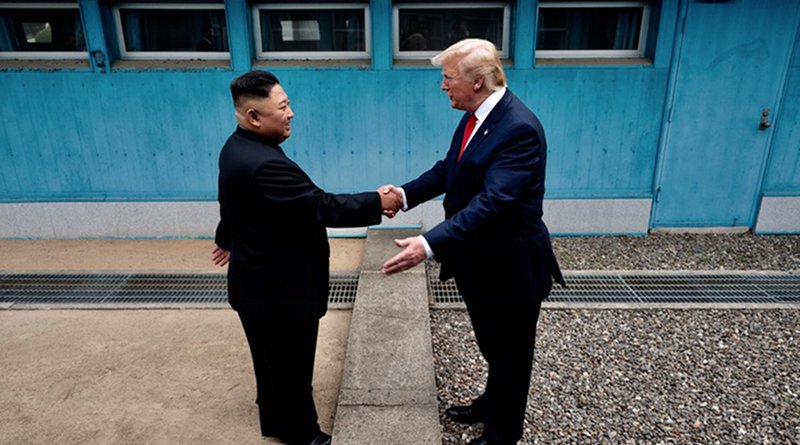Donald Trump Goes To North Korea, But Does It Matter? – Analysis
By Published by the Foreign Policy Research Institute
By Benjamin Katzeff Silberstein*
(FPRI) — What really makes something “historic?” Surely, President Donald Trump’s steps onto North Korean soil were historic firsts. Just a couple of years ago—and this cannot be stressed enough—virtually everything that went down in the Demilitarized Zone (DMZ) on June 30 would have seemed unimaginable. But to truly call something historic, it would have to carry significance. To that end, about Trump’s and Kim Jong-un’s impromptu summit, we just don’t know. The biggest outcome is that working groups between the two sides will get back to fleshing out the actual substance of a potential agreement. This is by far the most important aspect of the summitry between the U.S. and North Korea because like Hanoi showed, if the nitty-gritty isn’t worked out beforehand, then summits themselves matter very little.
Is basically getting back to square one from a derailed process historic? It all depends on the outcome down the line. Should the process result in tangible peace and relations between the U.S. and North Korea, then surely, the impromptu summit will have proven to be historic. But if it ends up fizzling out, which has seemed increasingly likely in the months since Hanoi, it’ll just be remembered as one of many failed attempts at getting a process back on track that was doomed to fail from the beginning.
We still know very little about what was said. But, as of now, overall, there is more cause for optimism than pessimism, from the point of view of Kim and Trump (who both want an agreement, despite internal disagreements in both governing apparatuses). Trump may have suggested the meeting spontaneously and without any concrete message to deliver, with the show itself being the main purpose.
For Kim, however, the risks were greater. The news of purges and shakeups post-Hanoi in the North Korean top strata have disappeared into the shadows since the process has moved on, but these events in Pyongyang—whatever happened (we still don’t fully know)—say a lot about the interconnectedness between international diplomacy and domestic politics in North Korea.
The public nature of the diplomatic process with the U.S. is potentially risky for many of those involved. In a system so centered around the leader such as the one in North Korea, neither the leader nor the country’s system or ideology can ever be seen to be at fault. If things don’t go the way they were supposed to, then the fault has to be that of insubordinate underlings who cannot properly take instructions, or, worse, consciously sabotage the leader’s brilliant plans. Hanoi was an embarrassment for Kim Jong-un, who appeared to have traveled all that distance for nothing. It’s unlikely that he’d do the same thing again.
The fact that Kim even went to Panmunjom accompanied by flashing cameras indicates that he had a concrete goal in sight, or a message to deliver to move things forward. A North Korean media report said that the “top leaders of the two countries expressed great satisfaction over the results of the talks.”
Another apparent result from the summits (remember, Trump held talks with South Korea’s Moon Jae-in as well) is that Korea has two leaders who are both fantastically skilled “Trump whisperers.” Both Kim and Moon clearly handle Trump in a way that works for their respective purposes. At their joint press conference, Moon repeatedly praised Trump’s role in the peace process. Moon’s rhetoric implicitly rhymes well with Trump’s claims that under any other president, North Korea and the U.S. would have been at war.
Similarly, North Korean outlets and spokespersons constantly emphasizes the chemistry between Kim and Trump. Trump may, ironically given his unconventional style, be a leader relatively easy for North Korea to understand because his foreign policy has become more about the personal relationships than the substance or history of bilateral relations. They are convinced that the main key to getting U.S. policy where they want it is to focus their energy and attention on Trump personally. The question remains if that will be enough.
On June 30, New York Times reported that the Trump administration is considering settling for a freeze on North Korea’s nuclear weapons production, while essentially recognizing North Korea as a nuclear state. That would be a gigantic win for Kim Jong-un, but it may also be the only deal possible between North Korea and the U.S. Both South and North Korea know that a deal is something Trump is after and is prepared to sacrifice a great deal to get. Neither is afraid to use that fact to their advantage.
*About the author: Benjamin Katzeff Silberstein is an Associate Scholar and 2019 Templeton Fellow with the Foreign Policy Research Institute, focusing primarily on the Korean Peninsula and East Asian region.
Source: This article was published by FPRI

